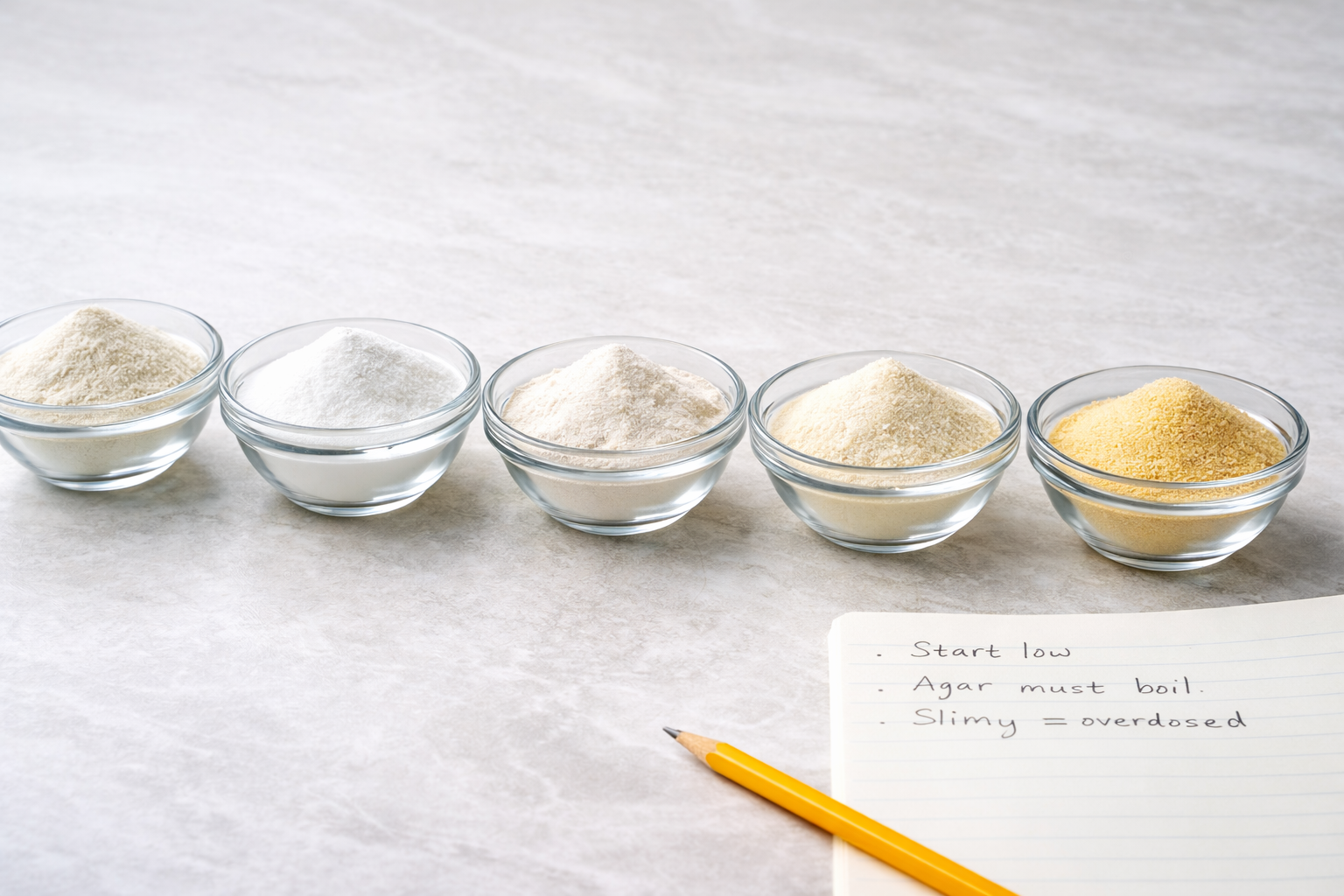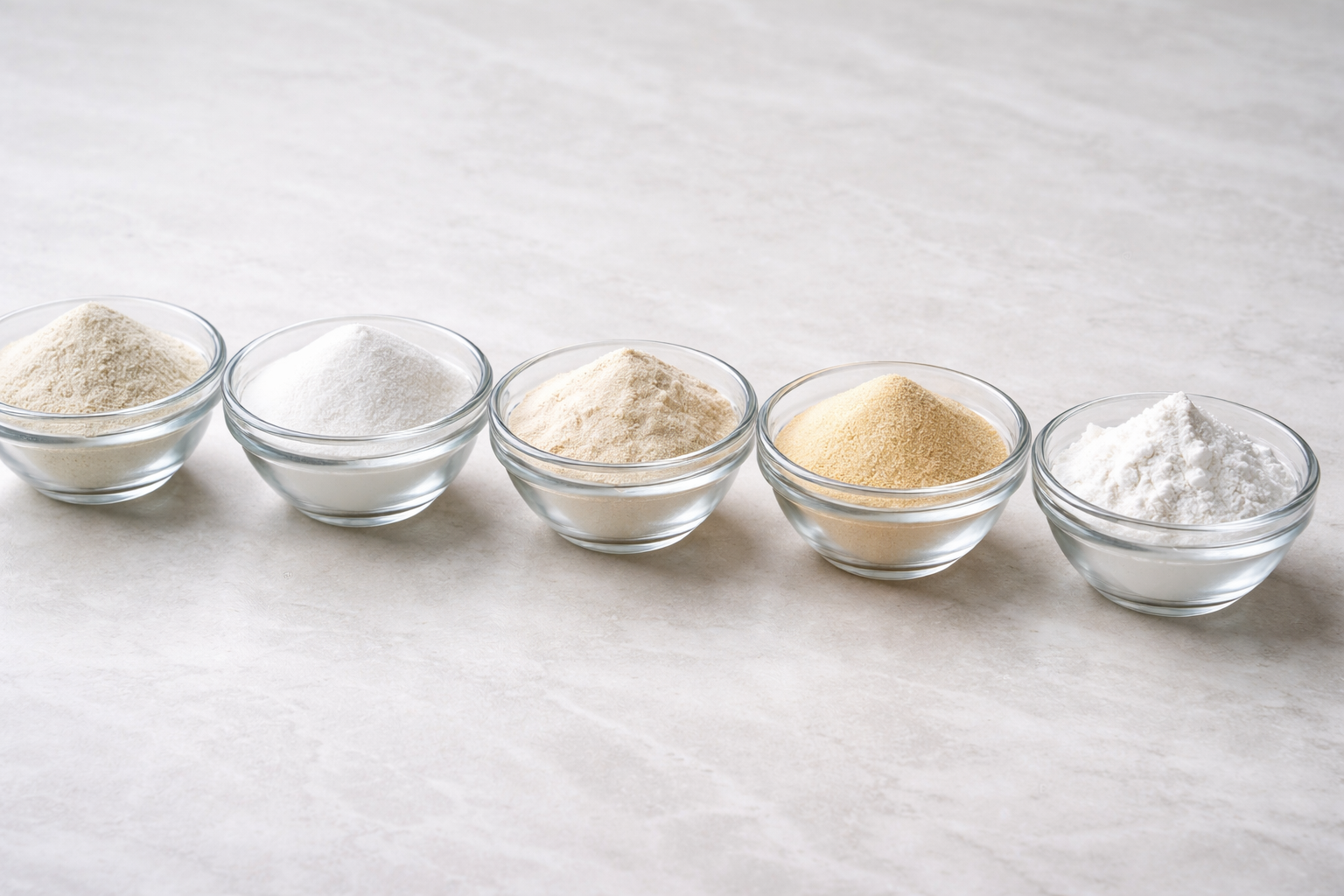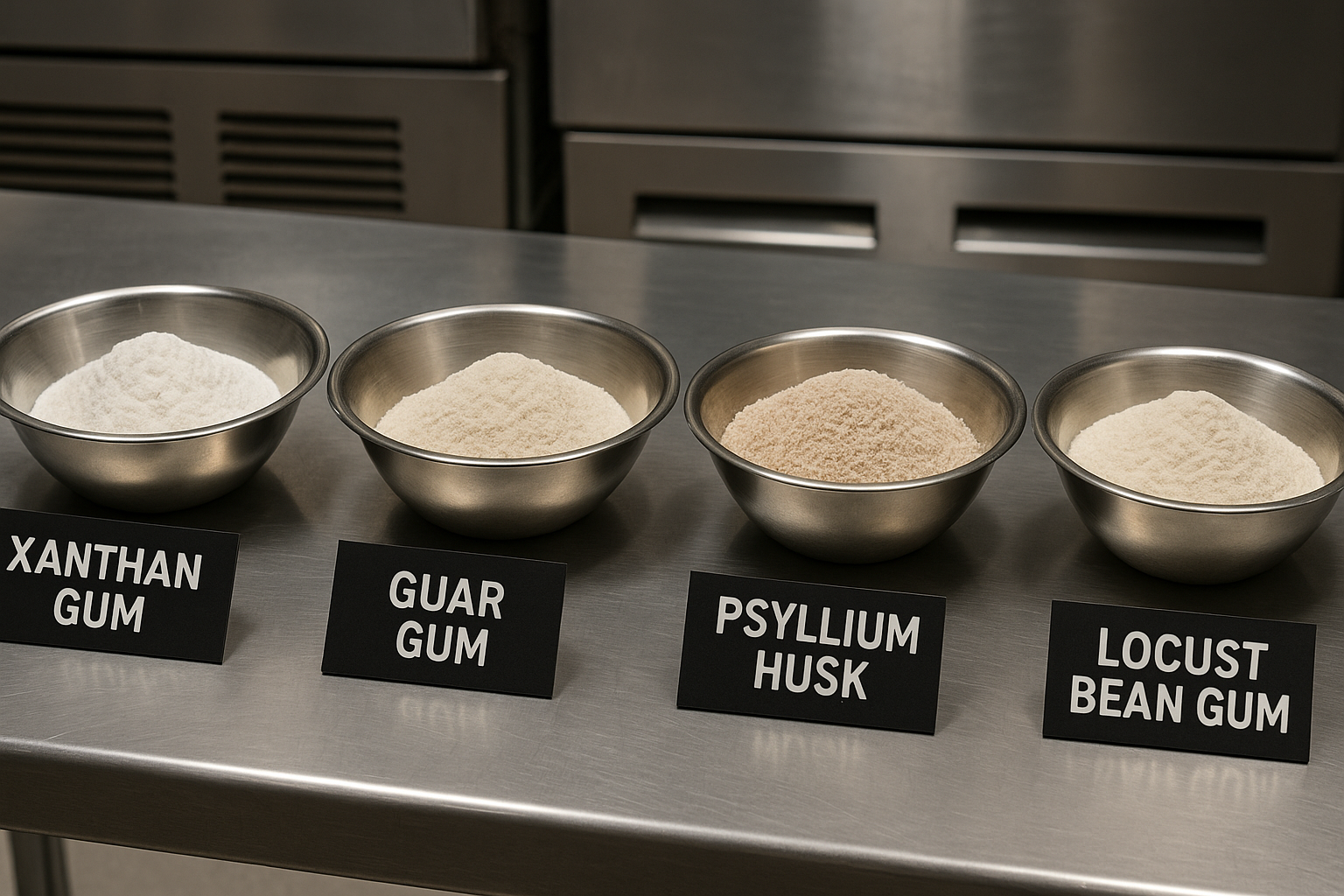Trending searches
Trending searches

Best Emulsifiers for Every Application: Which One Should You Use and Why?
SUBSCRIBE TO OUR BLOG
Promotions, new products, and recipes.
Key Takeaways:
-
Xanthan gum is ideal for cold emulsions like dressings and sauces — strong and clean-label.
-
Lecithin balances natural sourcing with solid performance in dairy and beverage systems.
-
Mono- and diglycerides offer unmatched emulsification for commercial hot prep but aren't always clean-label.
-
We rank emulsifiers by emulsifying strength, taste neutrality, and cost per use, and give clear use-case recommendations.
Why Choosing the Right Emulsifier Matters
Whether you're making a smooth salad dressing, creamy dairy blend, or emulsified sauce, the wrong emulsifier leads to separation, off-textures, or curdling.
The right one? Gives you silky consistency, better shelf life, and clean ingredient labels.
This guide compares the most-used emulsifiers in culinary and food manufacturing and helps you decide based on your recipe’s method and purpose.
Emulsifiers Compared and Ranked
| Emulsifier | Emulsifying Power | Taste Impact | Cost per Use | Best For | Overall Rank |
|---|---|---|---|---|---|
| Mono- & Diglycerides | ★★★★★ | Neutral | Very Low | Hot dairy, sauces, commercial use | ★★★★★ |
| Xanthan Gum | ★★★★☆ | Neutral | Low | Cold dressings, sauces, beverages | ★★★★☆ |
| Lecithin (Sunflower) | ★★★★☆ | Slightly nutty | Low | Dairy drinks, sauces | ★★★★☆ |
| Mustard Powder | ★★★☆☆ | Tangy/spicy | Low | Natural vinaigrettes | ★★★☆☆ |
| Gum Arabic | ★★☆☆☆ | Neutral | High | Clear beverages, syrups | ★★☆☆☆ |
Cold Prep Recommendations
1. Cold Sauces & Salad Dressings
Best Choice: Xanthan Gum or Mustard Powder
-
Prevents separation
-
Clean label
-
Low usage rate (0.3–0.5%)
✅ Shop Xanthan: Cape Crystal Brands Xanthan Gum
2. Emulsified Beverages (e.g., plant milks, protein shakes)
Best Choice: Sunflower Lecithin
-
Easily disperses fats in liquids
-
Adds creaminess and stability
-
Soy-free option available
✅ Shop Lecithin: Sunflower Lecithin – Cape Crystal Brands
Hot Prep Recommendations
3. Dairy Sauces, Gravy, Hot Cream Blends
Best Choice: Mono- & Diglycerides
-
Survive heat
-
Powerful emulsification at low dose
-
Used extensively in industrial and foodservice kitchens
✅ Not currently available at Cape Crystal — contact us for sourcing options.
Comparison Table: Cost, Taste & Usage
| Emulsifier | Typical Dose | Cost/100g | Estimated Use Cost (per 500g batch) |
|---|---|---|---|
| Xanthan Gum | 0.3–0.6% | $8.00 | $0.24–$0.48 |
| Lecithin (Sunflower) | 1–2% | $7.50 | $0.75–$1.50 |
| Mono- & Diglycerides | 0.2–0.5% | $6.00 | $0.12–$0.30 |
| Mustard Powder | 1–3% | $5.00 | $0.50–$1.50 |
| Gum Arabic | 5–10% | $9.00 | $4.50–$9.00 |
Decision Map: Find Your Ideal Emulsifier
Step 1: Is your recipe served hot or cold?
→ Cold → Step 2
→ Hot → Step 4
Step 2: Need clean-label or natural ingredients?
→ Yes → Choose Xanthan Gum or Mustard
→ No → Try Lecithin
Step 3: Is flavor neutrality important?
→ Yes → Go with Xanthan or Lecithin
→ No → Mustard Powder adds zing
Step 4: Is this a commercial or dairy-based hot item?
→ Yes → Choose Mono- & Diglycerides
→ No → Try Lecithin or Xanthan Gum
8 Key Buyer FAQs
1. Are mono- and diglycerides natural?
They are considered safe but are typically synthetic emulsifiers derived from vegetable oils or animal fats.
2. Can xanthan gum emulsify oil and water alone?
Xanthan stabilizes emulsions but doesn't act as a true emulsifier on its own. It thickens and suspends.
3. What’s the cleanest emulsifier for vegan products?
Sunflower lecithin or xanthan gum — both are vegan, non-GMO, and natural.
4. Which emulsifier works best for acidic dressings?
Xanthan gum handles low pH well and won't break down like some proteins or lecithins.
5. Will lecithin change the flavor of my sauce?
It may add a slightly nutty or earthy flavor, especially in higher doses.
6. Can I combine xanthan and lecithin?
Yes — they work synergistically to emulsify and stabilize.
7. Is gum Arabic worth the cost?
Only for beverages where clarity and light viscosity are key — otherwise, choose xanthan or lecithin.
8. Are mustard and lecithin allergens?
Mustard is a declared allergen in many countries. Sunflower lecithin is soy-free and generally hypoallergenic.
✅ Final Recommendation
-
Use Xanthan Gum for cold, stable emulsions with clean labels.
-
Choose Sunflower Lecithin for creamy beverages and dairy.
-
Go with Mono- & Diglycerides when working with hot systems and high fat content.
-
Use Mustard Powder when flavor and all-natural appeal matter most.
-
Reserve Gum Arabic for specialty beverage emulsions.
🛒 Shop emulsifiers now at Cape Crystal Brands, and make every blend smoother, creamier, and shelf stable.

|
About the Author Ed is the founder of Cape Crystal Brands, editor of the Beginner’s Guide to Hydrocolloids, and a passionate advocate for making food science accessible to all. Discover premium ingredients, expert resources, and free formulation tools at capecrystalbrands.com/tools. — Ed |
Related Posts

Hydrocolloid Rules of Thumb: Ratios, Mistakes & Fixes Chefs Use

Thickener Usage Chart: Best Ingredients for Sauces, Baking, Drinks & Gels

Hydrocolloid Substitution Table: Replacing Xanthan, Guar, Agar & More
Enjoyed this post? Subscribe to The Crystal Scoop
Food-science tips, ingredient know-how, and recipes. No spam—unsubscribe anytime.
- Choosing a selection results in a full page refresh.
POLICY PAGES
QUICK LINKS
ABOUT US
Cape Crystal Brands,
- 18 Bank St., Suite 1, Summit NJ 07901.
- Phone: +1 908-273-5600
- Email: info@capecrystalbrands.com
- Tax ID: 26-2477626000
- FDA Facility # 16980627550
- Kosher Certified by: OKosher.org
Country/region
© 2026, Cape Crystal Brands | Sitemap
